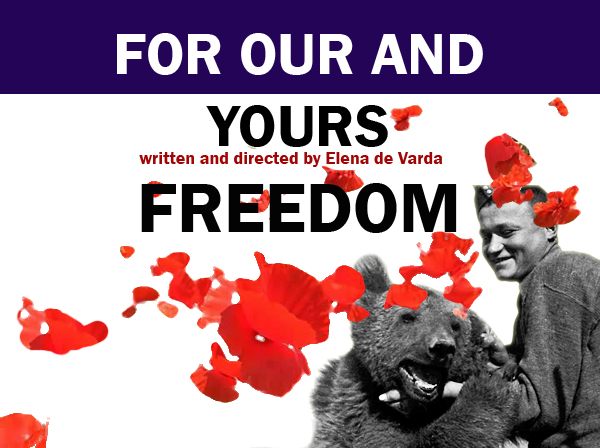FOR OUR FREEDOM AND YOURS
Co production with RAI STORIA

Here the presentation in Rome with the RAI President Anna Maria Tarantola
LOGLINE:
“For our freedom and yours” is a moving and emotional inscription on a Polish war memorial in southern Italy. It was the battle cry of thousands of Polish soldiers in 1944 at the battle of Monte Cassino, a bear was also enrolled as a soldier. his name was Wojtek:
MORE INFO AT THIS LINK: https://montecassinofilm.wordpress.com/
SYNOPSIS
The allies had conquered North Africa and were advancing slowly north from the foot of Italy but had stalled at the seemingly impregnable German fortifications running across the narrowest point of Italy known as the Gustav Line. By May 1944 the allies had been fighting along the Gustav Line for four months. Three major offensives had failed but its destruction was crucial to securing the Allied advance to Rome.
For the fourth offensive, the allies were bolstered by an incredible Polish Army created mainly from Polish citizens released from Stalin’s hard labour camps in Siberia. Better planning and coordination ensured success and the famous Polish 2nd Corps jubilantly captured the abbey at the summit of Monte Cassino and not only helped to open the road to Rome but also, they hoped, the route to their homeland of Poland.
Following the battle of Monte Cassino the Polish 2nd Corps advanced along the Adriatic coast and were joined by Italian soldiers, once on the side of the Germans now with the allies they now fought together for their liberation as brothers; the same ideas, the same spirit, but facing two differing destinies. The Italians were liberated and achieved democracy immediately after the war, but for most Poles, it was to take almost half a century with the victory of Solidarity (Solidarnosc) in 1989. Sadly, for the Poles from eastern Poland exiled to the labour camps of Siberia their Poland was never to return. Initially incorporated into the Soviet Union eastern Poland is now part of Belarus and Ukraine and its former residents dispersed around the globe are part of Polonia – the Polish Diaspora.
The fate of Poland had effectively been sealed even before the Polish involvement at Monte Cassino. In what is now considered to be the “Western Betrayal” of Poland Churchill and Roosevelt in a confidential agreement signed at Tehran had acceded to Stalin’s demands on Poland’s post-war eastern border. In Italy over 150,000 Polish soldiers continued to fight with enthusiasm even though their future was far from clear.
The cruel fate of the Polish Army is reflected by the fate of another emblematic character, Wojtek the bear, the official symbol of the 22nd Transport Company of the Polish 2nd Corps. He was bought from locals near the town of Hamadan in Iran as the Polish Army travelled from Russia to camps in Iraq. As he grew he became a companion to the soldiers and was only allowed to travel by being drafted into the army with official military documents and a passport and so the legend of Wojtek the soldier bear was born.
Wojtek grew into an adult bear weighing almost 250 kilos and standing nearly 2 metres tall. He enjoyed drinking beer, wrestling with his fellow soldiers and helping move crates of ammunition even in the thick of battle. At the end of the war, he travelled to Scotland where he became popular among local civilians and the press but when the soldiers demobilised he was given to Edinburgh zoo where he lived until his death in 1963.
The destiny of Wojtek, downgraded from the famous soldier bear to an exhibit in Edinburgh Zoo is reflected in the fate of the Polish 2nd Corps: they too never realised the freedom they struggled and fought so hard for. The film follows the parallel destinies of Wojtek the bear and the veterans of the Polish 2nd Corps now spread around the globe.
Our film is created from archive material gathered from around the world, conducting interviews with survivors and their relatives together with the use of original photographs and films. It describes a little known and unbelievable chapter of recent history not only from the point of view of a very special bear but also from the unimaginable suffering and isolation of a Polish nation torn apart by war and struggling to rebuild their future supported by their unwavering faith.
